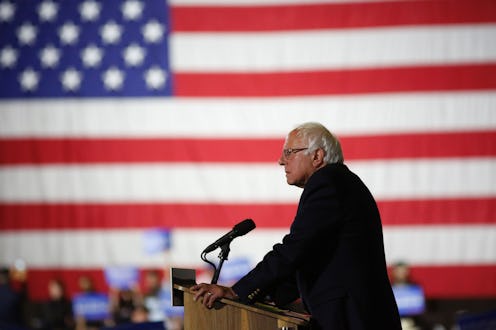News
Corruption Didn't End Bernie Sanders' Campaign
Wednesday is not an easy day for myself or my fellow supporters of Sen. Bernie Sanders, as we find ourselves trying to come to terms with the fact that the candidate who invigorated our hope in the possibility of progressive politics within a major party will not be the Democratic nominee. There are lots of reasons Sanders didn't win the nomination, but a common narrative that has developed among his supporters is that the election was rigged against Sanders, that the nomination was stolen from him. But Sanders didn't lose because of corruption, and the narrative that he did threatens to distract us from the much broader systemic forces working against him that demand our attention.
Some Sanders supporters have been quick to jump on any perceived irregularity during the primary season as a clear effort of obstruction against the Sanders campaign. These events do deserve our attention. Brooklyn's voter "purge" was messed up. The Nevada state convention was chaos. The fact that 3 million New Yorkers couldn't participate in the state's primary because they're registered as independent and didn't change their affiliation by the October deadline certainly doesn't sit well with me. And Iowa's coin-toss delegates were pretty ridiculous.
Maybe some of these incidents did involve an element of corruption. And, if so, those should be exposed and remedied. But none of these factors, either individually or collectively, cost Sanders the nomination.
Though I don't believe Sanders lost because of corruption, I also don't agree with Nate Silver's conclusion that Sanders lost simply because more people voted for Sec. Hillary Clinton. It's true that they did, of course, but this oversimplifies the matter. There were forces pushing against Sanders' campaign, directly or indirectly, all the way. But those forces aren't corrupt — which is to say, illegal. They are baked into the political process. And that, in my opinion, is what most needs our attention — how the political system as it is naturally and legally inhibits the representation of a significant portion of Americans.
The two-party system is naturally resistant to views that deviate from the moderate Democratic or Republican tack. This got shaken up significantly in 2016, with Donald Trump's bizarre candidacy on the right and Sanders' impressive performance on the left. But it is not surprising that Sanders didn't win. It's not surprising that Clinton had the overwhelming support of the establishment (as indicated by superdelegate support) and registered Democratic voters as well. And it's not surprising that the media gave her more coverage in the early days of the race. None of those things are surprising, and neither are they illegal. What's surprising is that Sanders did as well as he did — and the fact that it's so surprising points to the problem.
As I see it, the biggest inhibitors of Sanders' campaign all relate back in some way to the two-party system: Independents being unable to vote in certain contests, disparity in media coverage early on, the "Clinton inevitability" narrative kicked off by The New York Times as early as February 2015, and the people who may have supported Sanders but stayed home on primary day because they have never been able to see themselves as part of the political process. Let's take a look at these factors.
State political parties can choose to hold closed primaries because, well, they want Republicans and Democrats to be in charge of selecting Republicans and Democrats. They want their parties to remain their parties. That's understandable. But it's not acceptable when 42 percent of Americans are independents and no candidate besides a major-party candidate stands a chance to win in the general election. Sanders had the overwhelming support of independents, not all of whom could vote in the primaries because they didn't change their affiliation in time. That likely hurt Sanders. And it calls into question the fairness of closed primaries in a two-party system.
Another thing that may have hurt Sanders is that the media in general arguably didn't take his candidacy as seriously as Clinton's, if coverage is a reliable indicator. An analysis by media tracking firm mediaQuant found that, as of March, Clinton had received about $746 million-worth in free media coverage, compared to Sanders' $321 million-worth. The media's disproportionate attention to Clinton, along with the narrative of Clinton's inevitable nomination, can be traced back to the mentality ingrained in us by two-party politics: moderates win, and the established will remain established. And perhaps this mentality is why many people abstain from voting, even when there's a candidate in the running who represents their views better than any candidate has before.
The forces of resistance against Sanders' campaign originate in the two-party system, not corruption. As Sanders himself put it on Face The Nation at the end of May when asked about the primary process:
I wouldn't use the word "rigged," because we knew what the rules were. But what is really dumb is that you have closed primaries, like in New York State, where three million people who were Democrats or Republicans could not participate. Where you have a situation where over 400 superdelegates came on board Clinton's campaign before anybody else was in the race, eight months before the first vote was cast. That's not rigged. I think it's just a dumb process, which has certainly disadvantaged our campaign.
Going forward, I hope that Sanders' supporters invest the same amount of energy and passion that has gone into the corruption narrative into a constructive conversation about how dumb the two-party system is, and how we can resist its constraints.
